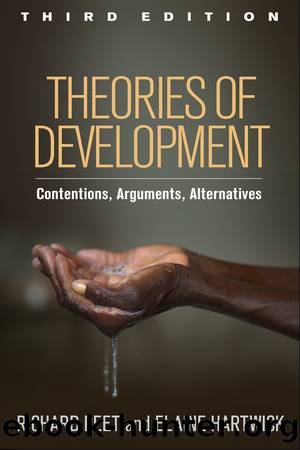Theories of Development : Contentions, Arguments, Alternatives (9781462519613) by Peet Richard; Hartwick Elaine

Author:Peet, Richard; Hartwick, Elaine [Richard Peet, Elaine Hartwick]
Language: eng
Format: epub
ISBN: 9781462519613
Publisher: Guilford Pubn
IMPERIALISM
From the Marxist perspective, capitalism is a social form of development based on the extraction of surplus value from workers and competition among capitalists. Extraction may be internal to a social formation, as with the exploitation of the working class in the United States or Britain. Or, it might be externalâbetween capitalists in one society, the United States, for instance, and the peasants and workers of other societies, like the border regions of Mexico. Marxist theories of imperialism specifically look at the second type of exploitation, capitalist societyâs external spatial relations. Essentially there have been two main historical phases of Euro-American imperialism, although some Marxists believe we have entered a third phase of âneoimperialism.â
Lasting from the 15th to the 19th centuries, mercantilist imperialism saw the European conquest of most of the Americas and significant control over much of southern and southeast Asia. Conquest and control involved the plundering of ancient stockpiles of wealth from precapitalist civilizations, the establishment of unequal trading relations with dominated societies, and the production of bullion and exotic commodities, using coerced (often slave) labor in colonized societies. In Marxâs terms, mercantilist imperialism enabled the âprimitive accumulationâ (primitive in terms of âearlyâ or âfirstâ) of stocks of global wealth that were then invested as capital in the western European and North American industrial revolutions.
Mercantilism involved massive state control over societyâs external relations to the point of declaring war on foreign competitors or heavily regulating trade and commerce to the advantage of the home country (see Chapter 2). Once the forces of production had developed and Britain, for example (as the leading mercantilist country), had a decided economic advantage in industrial production, mercantilist protection was dropped and âfree tradeâ (between unequal partners) came to be relied on for continued global economic dominance (again, see Chapter 2). Mercantilist theory postulated that a countryâs level of development depended on its accumulation of gold and silverâhence, external relations with other countries were managed to maximize bullion imports to (and minimize exports from) the home country, thereby building up the national treasury. Thus, mercantilism was the perfect prelude to industrial capitalism in that under mercantilist imperialism the world was raided for its wealth (bullion was the first capital) and slaves were forcibly abducted from western Africa to work in the Caribbean, Brazil, and the United States so that profits from slaving could be reinvested in industrialization even as they also produced essential inputs into industrialization, such as sugar and cotton. Finally, the most âsuccessfulâ mercantilist countries and regions had Protestant majorities (Britain, the Netherlands, New England) or significant Protestant minorities (the Huguenots in France) who proved better able (had a more modern ideology, Calvinist rationality) to run production and trade than Catholic merchantsâfor example, the Brazilian sugar plantations were run by Dutch rather than Portuguese managers (see Chapter 4 on Weber). As was noted in the section on the EnglishâPortuguese trade in Chapter 2, Britain was by far the main beneficiary from this first mercantilist phase of imperialism.
The wars of independence in
Download
This site does not store any files on its server. We only index and link to content provided by other sites. Please contact the content providers to delete copyright contents if any and email us, we'll remove relevant links or contents immediately.
The Future Internet by Bernard Marr(541)
Focus Group Methodology by Pranee Liamputtong(506)
Python for Finance Cookbook by Lewinson Eryk;(470)
Empowering Public Speaking by Deanna L. Fasset & Keith Nainby(438)
Doing business with Japan : successful strategies for intercultural communication by Kazuo Nishiyama(414)
Global Orders and Civilizations : Perspectives from History, Philosophy and International Relations by Sadik Unay; Muzaffer Senel(341)
Engaging with Ethics in International Criminological Research by Michael Adorjan Rose Ricciardelli(329)
Intentional Power: The 6 Essential Leadership Skills For Triple Bottom Line Impact by Lisen Stromberg & JeanAnn Nichols & Corey Jones(293)
Analysis of Financial Statements by Frank J. Fabozzi & Frank J. Fabozzi(290)
The Economics of Banking by Jin Cao(287)
The Three Skills of Top Trading by Hank Pruden(282)
Entrepreneurial Marketing by unknow(279)
Focus on Teaching by Jim Knight(263)
The Oxford Handbook of Banking and Financial History by Youssef Cassis;Richard S. Grossman;Catherine R. Schenk;(256)
Data Science and Analytics for SMEs: Consulting, Tools, Practical Use Cases by Afolabi Ibukun Tolulope(251)
New India by Arvind Panagariya(249)
Building a Career in Cybersecurity: The Strategy and Skills You Need to Succeed by Yuri Diogenes(243)
Financial Statement Analysis by Martin S. Fridson;Fernando Alvarez; & Fernando Alvarez(240)
Maximum Success with LinkedIn by Dan Sherman(226)
